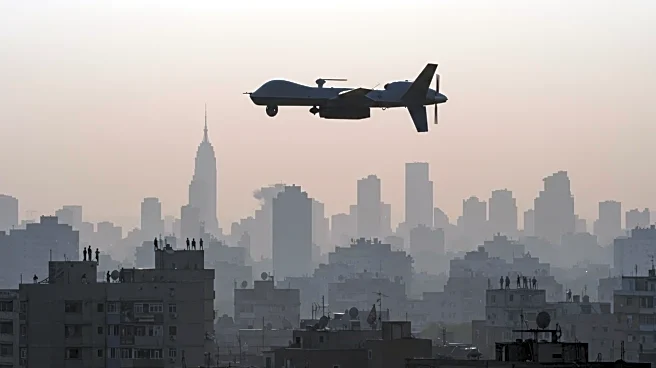What's Happening?
Israel's military operations in Gaza have been marked by significant civilian casualties and a lack of clear strategic objectives, according to a joint investigation by several media outlets. The investigation revealed discrepancies between the actual and reported numbers of Hamas and Palestinian Islamic Jihad fighters killed. While Israel's military database lists 8,900 fighters as killed or probably killed, public figures have been reported as high as 20,000. The focus on militant death tolls has been criticized as a metric of success, overshadowing the high civilian death rate. The conflict has resulted in extensive destruction in Gaza, with much of the area reduced to rubble and a significant portion of the population displaced.
Why It's Important?
The ongoing conflict in Gaza has significant implications for regional stability and international relations. The high civilian casualty rate and destruction have drawn criticism from human rights organizations and could impact Israel's diplomatic standing. The focus on militant casualties as a measure of success raises ethical concerns and questions about the long-term strategy for peace and security in the region. The conflict also affects U.S. foreign policy, as the U.S. is a key ally of Israel and has interests in promoting stability in the Middle East. The humanitarian crisis in Gaza could lead to increased international pressure on Israel to alter its military tactics and seek a diplomatic resolution.
What's Next?
Israel's military strategy may face increased scrutiny from both domestic and international observers. There could be calls for a reassessment of military objectives and tactics, particularly in light of the high civilian toll. The potential for continued conflict raises concerns about further humanitarian impacts and the possibility of escalating violence. International bodies and human rights organizations may push for investigations into alleged war crimes and seek accountability for actions taken during the conflict. The situation may also influence future U.S. foreign policy decisions regarding military aid and diplomatic support for Israel.
Beyond the Headlines
The conflict in Gaza highlights broader issues of military ethics and the challenges of asymmetrical warfare. The use of civilian casualty figures as a measure of success raises questions about the moral implications of military strategies that prioritize enemy body counts over civilian protection. The situation also underscores the difficulties in achieving lasting peace in regions with deep-seated political and social tensions. The humanitarian crisis in Gaza may have long-term effects on the region's socio-economic stability and could influence future recruitment and radicalization efforts by militant groups.








